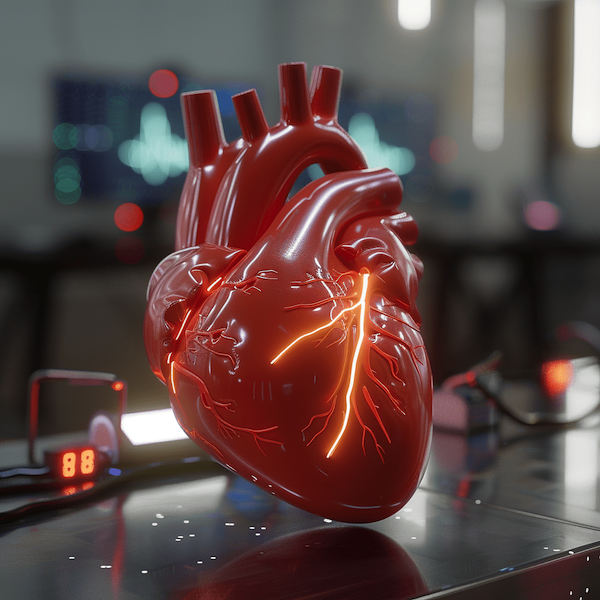The benefits of CBD oil for heart health are becoming increasingly apparent. More research has recently focused on how CBD can help prevent heart disease and strengthen cardiovascular well-being. Specifically, CBD’s anti-inflammatory and vasodilating effects enable it to support reduced cardiac risk. A growing body of clinical research indicates that CBD oil can lower blood pressure, mitigate hypertension, reduce cholesterol levels, and promote circulation. CBD is not recommended as a treatment for heart disease but instead offers support for overall cardiovascular function. Taking advantage of its potent natural abilities to assist the heart and blood vessels may be worthwhile if you want to improve your health. In this article, we’ll detail the top benefits of CBD oil for the heart, how it works, and tips on using it.
Does CBD Oil Help with Cardiovascular Function?
The short answer is yes. CBD helps with cardio function. To understand this, let’s examine how it works.
The cardiovascular system is a network of blood vessels and organs that transport oxygen and nutrients to the cells via the blood. CBD can interact with the cardiovascular system through the body’s endocannabinoid system (ECS). The principal function of the ECS is maintaining homeostasis, which is internal balance in the body’s systems. It achieves this balance by using signalling receptors that enable it to modulate physiological processes. One of these processes is cardiovascular regulation and circulation.
In other words, CBD does not directly affect the cardiovascular system. Instead, it activates the ECS, which alters cardiovascular function. For example, CBD is known to enable vasodilation. It can stimulate the opening of blood vessels to help with blood flow and cardiac regulation. New research indicates this type of effect via the endocannabinoid system may play an essential role in maintaining the overall health of the cardiovascular system.
Notably, CBD isn’t psychoactive. It’s different to THC, which causes the high from cannabis use. In contrast, CBD is very safe, non-addictive and well-tolerated. CBD oil or other consumables containing low THC content can be taken without the risk of causing a high.
Top Benefits of CBD for Heart Health
Here are some crucial ways CBD oil helps the heart and cardiovascular system.
Anti-Inflammatory Effects
A core benefit of CBD oil for circulation is its anti-inflammatory properties. Inflammation is a crucial cause of many heart diseases. When veins or arteries become inflamed, they accrue microscopic damage. This reduces their ability to move blood throughout the body. It also strains the heart and can contribute to arterial plaque build-up. Over time, this can cause a feedback loop, worsening cardiovascular problems.
New studies have proven CBD can help lower inflammation in the blood vessels to prevent and reverse these issues. CBD’s anti-inflammatory properties protect cells in the arteries and veins from damage. This helps lower cardiac risks and reduces the incidence of inflammatory conditions like atherosclerosis. More clinical data indicates it also has antioxidative effects, which can help protect arterial linings. Antioxidants are potent compounds that help with cellular function, including cells in the heart and blood. Consuming them from CBD oil is an excellent way to bolster heart health. This clinical data is promising. It suggests CBD’s antioxidative and anti-inflammatory effects are fantastic for cardiovascular wellbeing.
Lowering Blood Pressure
CBD oil has also displayed potent abilities to reduce blood pressure by widening blood vessels (known as vasodilation). This allows for better circulation and more oxygenation in the body, helping to prevent cardiac diseases. This benefit is beneficial for people who suffer from hypertension or chronic high blood pressure. Elevated blood pressure can substantially increase the risk of stroke, heart attack, or other cardiac disorders. It’s thought that CBD also reduces overall stress levels and anxiousness, which underscores its blood pressure benefits.
An example of this was shown in a study where a single dose of CBD lowered stress to reduce blood pressure. This trial noted that CBD’s blood pressure benefits were most concentrated in people with chronic stress symptoms. CBD lowered cortisol and helped to ease vasoconstriction. Another study showed hypertensive patients displayed substantial blood pressure reductions following several months of being dosed with CBD daily. These discoveries have made cardiovascular researchers optimistic about CBD’s future. It may assist more people with naturally lowering blood pressure and preventing hypertensive symptoms.
Preventing Stroke and Heart Disease
Another benefit of CBD oil for cardiovascular health is its preventative, cardioprotective effects. Increasingly, studies are indicating it has the potential to reduce stroke, heart attack and myocarditis risks. CBD has been found to reduce heart damage and improve cardiac functioning after a heart attack. This indicates its effectiveness in preventing the occurrence of heart-related ailments. Daily use of CBD may attenuate risks of heart damage and offer cardioprotective benefits.
Moreover, various studies suggest that CBD works to prevent stroke damage to the heart or brain via similar mechanisms. Researchers have found CBD helps to prevent strokes from causing damage to the organs and cardiovascular system. It additionally helped stroke victims to rebuild their heart and circulatory function. Much of this was theorised to result from CBD’s anti-inflammatory and vasodilatory properties.
By defending the blood vessels and organs from inflammation, CBD helps to lower the risk of cardiac diseases and lowers their impact if they do occur. In other words, it helps reduce the more life-threatening eventualities of heart attacks and myocarditis. Animal studies have revealed that CBD reduces the tissue damage caused by these conditions. Keep in mind that most of the research on CBD’s ability to reduce stroke or heart attack risk was on animals. More conclusive data is required to confirm these claims for humans.
What Does the Evidence Say?
Let’s explore additional studies on CBD oil’s benefits for the heart. Other studies have further elucidated the cardioprotective properties of the compound. CBD has been found to reduce and improve cardiac functioning after heart attacks in rodent models. Moreover, researchers discovered in 2010 that CBD could protect stroke victims from severe brain damage while also boosting their recovery and cognitive function. Other trials showed it boosted blood flow and healing factors in the brain following stroke occurrence. These findings indicate that CBD may offer similar abilities in humans to block damage occurring in the cardiovascular system.
Other research published in a Scientific Journal demonstrated CBD oil worked to reduce blood pressure levels in healthy individuals. Additionally, a study published in the Journal of Pharmacology showed that CBD can have anti-inflammatory effects on the heart. This offered protective benefits against the damage caused by diabetes or heart diseases. More research is being released today on how CBD helps cardiovascular well-being and cardioprotection.
How to Use CBD Oil for the Heart
CBD oil is best used as a daily preventative measure for heart health. It isn’t a cure for heart disease. Instead, it should be treated as complementary support for overall reductions in blood pressure, lower cardiac inflammation, and greater heart strength. This makes it essential to use CBD daily and maintain use over time. Using it when you already have heart disease will be too late; however, it could still help. Finding the proper dosage of CBD oil for cardiovascular wellness can be tricky. Everyone responds to it differently, and there’s no standard for heart health dosages. An excellent daily starting dose is 10-20mg of CBD or 3-4 drops per day initially. Over time, you can increase this to meet your needs.
It is crucial to note that CBD may interact with other medications and cause complications, especially if you already have a heart condition. Don’t take it if you are using heart medicines like statins or blood thinners. This is particularly risky because of CBD’s blood pressure-reducing effects. We strongly advise speaking to your doctor before dosing with CBD oil. It’s also recommended to avoid products with THC in them as THC is known to impact heart health. Don’t rely on CBD oil to treat any diseases. It won’t help as a magic cure. Instead, it would help if you incorporated it into other preventative measures like a healthy diet, regular exercise, and stress management daily. This will help keep your blood pressure down, your heart healthy, and your circulation efficient.
Conclusion
There’s no doubt that CBD oil has powerful benefits for heart health. Modern science has now revealed these benefits. Clinical trials have proven the ability of CBD to reduce arterial inflammation, enable vasodilation, and offer cardioprotective advantages. It works through the body’s endocannabinoid system to restore the cardiovascular system to homeostasis. Studies have even shown that CBD both reduces cardiac disease risk and prevents damage when it occurs. Using it may help to lower the risk of heart attack and stroke. But don’t view it as a treatment or cure. CBD is not recommended as a treatment for heart disease but rather as a means of maintaining overall cardiovascular health. Speak to your doctor if you have heart problems and get their advice. Don’t use CBD before checking with them first.
References
- Rajesh, M., Mukhopadhyay, P., Bátkai, S., Patel, V., Saito, K., Matsumoto, S., Kashiwaya, Y., Horváth, B., Mukhopadhyay, B., Becker, L., Haskó, G., Liaudet, L., Wink, D.A., Veves, A., Mechoulam, R. and Pacher, P. (2010). Cannabidiol attenuates cardiac dysfunction, oxidative stress, fibrosis, inflammatory and cell death signaling pathways in diabetic cardiomyopathy. Journal of the American College of Cardiology, [online] 56(25), pp.2115–2125. https://www.ncbi.nlm.nih.gov/pmc/articles/PMC3026637/
- Choi, S.-H., Mou, Y. and Silva, A.C. (2019). Cannabis and Cannabinoid Biology in Stroke. Stroke, 50(9), pp.2640–2645.
- Hayakawa, K., Mishima, K. and Fujiwara, M. (2010). Therapeutic Potential of Non-Psychotropic Cannabidiol in Ischemic Stroke. Pharmaceuticals, 3(7), pp.2197–2212. https://www.ncbi.nlm.nih.gov/pmc/articles/PMC4036658/
- Shayesteh, M.R.H., Haghi-Aminjan, H., Mousavi, M.J., Momtaz, S. and Abdollahi, M. (2019). The Protective Mechanism of Cannabidiol in Cardiac Injury: A Systematic Review of Non-Clinical Studies. Current Pharmaceutical Design, 25(22), pp.2499–2507. https://pubmed.ncbi.nlm.nih.gov/31291873/
- Hayakawa, K., Mishima, K. and Fujiwara, M. (2010b). Therapeutic Potential of Non-Psychotropic Cannabidiol in Ischemic Stroke. Pharmaceuticals, 3(7), pp.2197–2212. doi:https://doi.org/10.3390/ph3072197.
- admin (2022). CBD Oil for Blood Pressure Australia: Benefits & Best Products. [online] Bondi Hemp. Available at: https://bondihempoil.com.au/blog/health-benefits/cbd-oil-blood-pressure/
- www.jameskcardimd.com. (n.d.). Three Ways That CBD Can Support A Healthy Heart – James K. Cardi, M.D. [online] Available at: https://www.jameskcardimd.com/blog/three-ways-that-cbd-can-support-a-healthy-heart




















